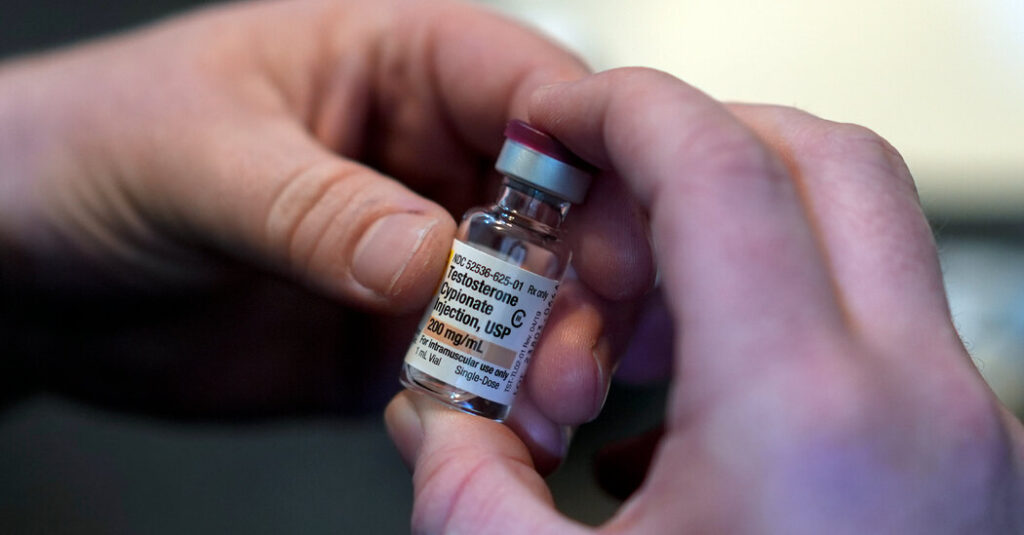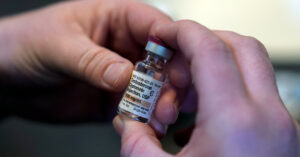Federal health officials published a report on Thursday declaring that the use of hormonal and surgical treatments in young people with gender dysphoria lacked scientific evidence and expressing concern about long-term harms, a stark reversal from previous agency recommendations and the advice of top U.S. medical groups.
The report instead prioritized the role of psychotherapy, a divisive intervention to treat gender dysphoria that many advocates and physicians have equated with so-called conversion therapy.
Other parts of the review seemed to call into question the very notion that some people have a gender identity that does not align with their sex at birth.
In January, President Trump signed an executive order titled “Protecting Children From Chemical and Surgical Mutilation” giving the Department of Health and Human Services 90 days to produce a report on the best practices for treating young people who say their gender does not align with their birth sex.
But the order made it clear that the administration had already reached its own conclusion about gender transition treatments for minors, characterizing the “blatant harm done to children” as a “stain on our nation’s history.”
The 400-page report took a more sober tone but reached a similar conclusion. In a remarkable departure from the standard for medical evidence reviews, the authors were not identified pending a post-publication review process that would begin in “the coming days.”
H.H.S. officials declined to answer questions about what the review process would entail. The department noted that the contributors included doctors, medical ethicists and a methodologist, all from “a wide range of political viewpoints” who were chosen “for their commitment to scientific principles.”
The report specified that the new assessment was not intended to set a standard for medical care or to make policy recommendations.
It relied predominantly on an analysis of reviews of the scientific studies of puberty blockers, hormone therapies and surgeries that have been published in the last few decades, when these treatments were first made available to adolescents.
The assessment concluded that while the benefits of medical interventions were uncertain, the harms, which can include loss of fertility, were less so.
The “clinical practice in this field of medicine is exceptional and concerning,” the report said, and it criticized American medical groups for fostering intolerant work “environments in which clinicians feel compelled to self-censor.”
The question of whether and when treatments like puberty blockers, hormone therapies or surgery are appropriate for young people has been the subject of fierce debate.
Several European countries have limited the treatments in recent years, after scientific reviews finding poor quality of evidence to support their benefits and uncertainty about long-term risks.
In the United States, 24 states have passed laws barring physicians from offering such treatments to adolescents.
The American Academy of Pediatrics is conducting its own review of the evidence. The academy and most major medical groups in the United States continue to endorse these treatments as effective in relieving the psychological distress many transgender youths experience.
“This report misrepresents the current medical consensus and fails to reflect the realities of pediatric care,” said Dr. Susan Kressly, president of the academy. “The report prioritizes opinions over dispassionate reviews of evidence.”
Transgender rights advocates criticized the new assessment as seeking to paint over an ideological view with scientific gloss.
During Mr. Trump’s first 100 days in office, his administration has sought to limit recognition of transgender identities in public life. The administration has threatened to end funding for hospitals that provide gender-transition treatments to people under 19 and to bar openly transgender people from serving in the military.
The administration has moved to house transgender women in federal prisons with men and to no longer reflect the gender identities of transgender people on passports.
“Is the administration’s hostility to this medical care based on actual scientific research, or is it ideologically driven by this administration’s open disapproval of transgender people and belief that transgender identity is false?” said Shannon Minter, legal director at the National Center for Lesbian Rights.
The center represents transgender individuals in several lawsuits challenging the constitutionality of the administration’s policies.
Casey Pick, director of law and policy at the Trevor Project, a nonprofit organization focused on suicide prevention among L.G.B.T.Q. young people, said, “To the extent that this is a document that is challenging even the ability of a young person to identify as transgender, that is an ideological statement — that is not a medical statement.”
The report is a victory for those who have described this field of medicine as part of a broader project that denies the realities of biological sex.
Roger Severino, vice president for domestic policy at the Heritage Foundation, a conservative think thank, applauded the H.H.S. report and blamed “profit-seeking doctors and ideological groups” for persuading families that “a child’s sex is whatever they say it is.”
About 3 percent of high school students identify as transgender, according to government data, a number that has risen substantially over the last decade. A much smaller percentage of those adolescents seek medical interventions.
The issue of medical transition for minors has nonetheless become a political flashpoint. Mr. Trump made it a focus of his campaign, and some Democrats believe the strategy helped him win.
The new H.H.S. report goes further than similar reports in European countries that have introduced new restrictions on gender treatments for adolescents.
An independent review of clinical services for young people in England, led by Dr. Hilary Cass, former president of the Royal College of Pediatricians, reached similar conclusions about the quality of evidence to support the use of puberty blocking and hormonal treatments in minors. (Surgeries are not available for minors in Britain.)
But that review, conducted over a four-year period, interviewed young patients, transgender adults, parents and clinicians to gain a broad picture of the medical field.
Dr. Cass concluded that the evidence on both the benefits and the risks of the treatments was “remarkably weak” but said that some young people were still likely to benefit from early intervention.
“There are young people who absolutely benefit from a medical pathway, and we need to make sure that those young people have access — under a research protocol, because we need to improve the research — but not assume that that’s the right pathway for everyone,” Dr. Cass said in an interview last year.
That review concluded by recommending that England’s National Health Service restrict the use of puberty blocking drugs to research trials only, and clinicians were advised to prescribe hormones to teenagers with “extreme caution.”
Other clinicians who have voiced concerns about the field of youth gender medicine were ambivalent about how the new report might be used.
“I am glad that authorities in the United States are finally taking into account what’s been going on in Europe in recent years,” said Erica Anderson, a child psychologist and former president of the U.S. Professional Association of Transgender Health.
She has been vocal about her concerns that youth gender clinics have moved away from careful mental health assessments as the population of children seeking gender treatments has grown.
But Dr. Anderson, who still supports early intervention for some young people, noted that it was impossible to ignore the inflammatory executive order that led to the report.
“It’s kind of like calling out to someone a rank insult and then deciding you want to have a conversation with them,” she said. “Well, that doesn’t really work very well with actual human beings with feelings and histories.”
Mr. Minter, of the National Center for Lesbian Rights, said that by emphasizing psychotherapy over medical interventions, the H.H.S. report effectively endorsed conversion therapy, intended to change a minor’s gender identity or sexual orientation.
Leading medical groups have supported bans on the practice, citing evidence that it causes depression, anxiety and self-hatred.
But the Supreme Court has agreed to hear a First Amendment challenge to a Colorado ban on conversion therapy next term, brought by a licensed professional counselor whose Christian faith includes the belief that “people flourish when they live consistently with God’s design, including their biological sex,” according to court documents.
Other therapists, including Dr. Anderson, have argued that so-called “exploratory” therapy with supportive clinicians can be helpful for helping to disentangle mental health issues from gender identity for adolescents.
Kellan Baker, who studies transgender health policy at Whitman Walker, a nonprofit community health center in Washington, said the report was a departure from how health policy had typically been shaped in the United States.
“It is important that medicine be practiced by those with expertise in it, by trained clinicians operating according to standards of care that are set out by their respective medical fields — not by the federal government,” Dr. Baker said.
He said he worried that the report might be cited by the government as justification for refusing to cover medical care for transgender young people.
The Centers for Medicare and Medicaid Services, a division of H.H.S., sent a letter to state Medicaid agencies last month urging them not use Medicaid funds for gender-transition care for minors.
Pam Bondi, the attorney general, has directed the Justice Department to investigate doctors who provide such care.
“This document is not a standard of care, but it’s going to be cited by the government as justification for refusing to cover medical care for transgender young people,” Dr. Baker said.











More Stories
Streeting accused of ‘betrayal’ over maternity funding plan
U.S. Prosecutors Accuse Large Insurers of Paying Kickbacks for Private Medicare Plans
Overlooked No More: Joyce Brown, Whose Struggle Redefined the Rights of the Homeless